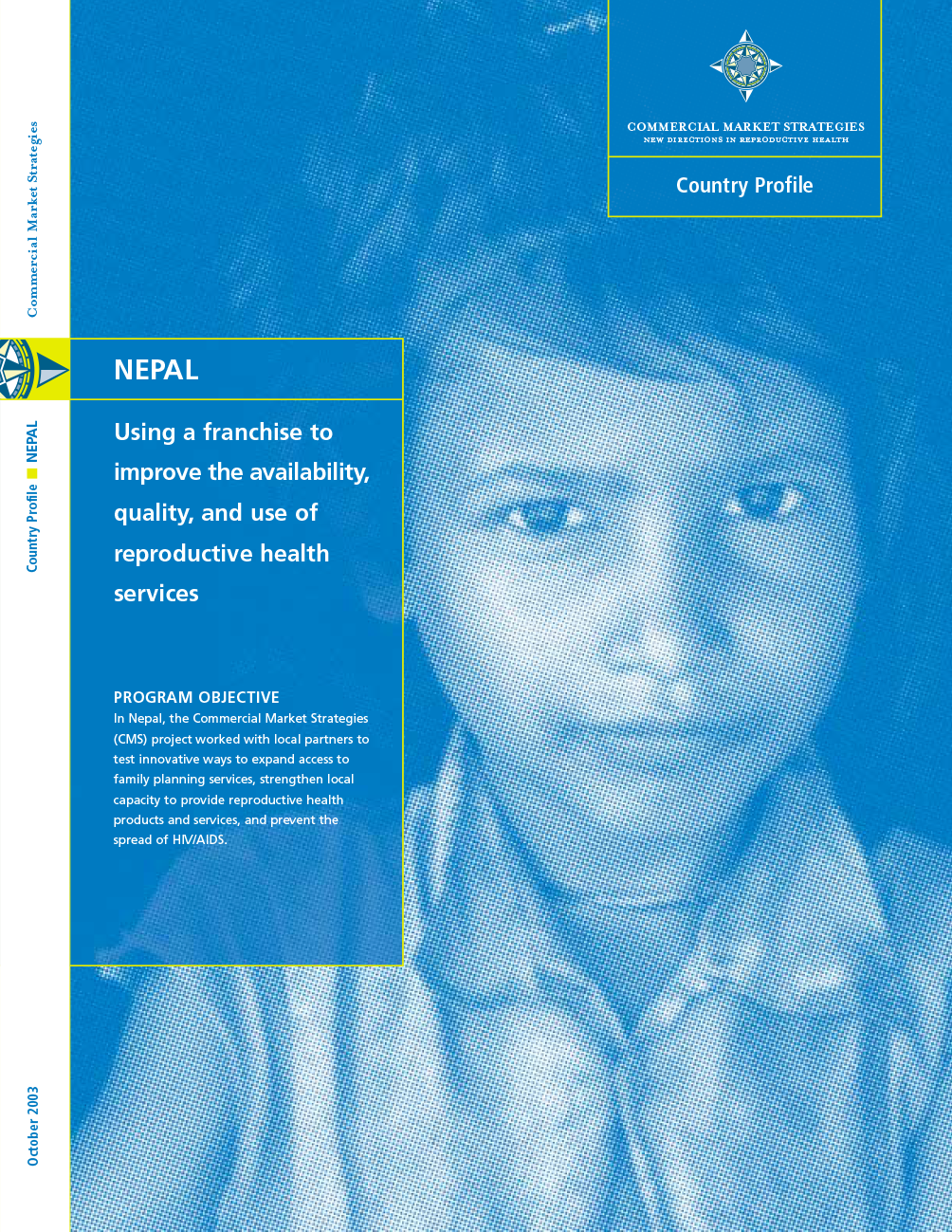
Resource Library
Country Profile: Nepal
In Nepal, the Commercial Market Strategies (CMS) project worked with local partners to test innovative ways to expand access to family planning services, strengthen local capacity to provide reproductive health products and services, and prevent the spread of HIV/AIDS. This profile provides an overview of the local context and discuss program goals, design, challenges, evolution, and impact.
Resource Type : Brief
Country : Nepal
Year : 2003-10-01T10:00:00
Language : English
Project : SHOPS

Resource Library
A Quasi-Experimental Study to Assess the Performance of a Reproductive Health Franchise in Nepal
In 2001, the Commercial Market Strategies project established a nurse and paramedic franchise in Nepal to increase utilization of reproductive health services and client satisfaction with service quality. To assess the impact of the intervention, CMS used a quasi-experimental study design, with baseline and follow-up measurements on non-equivalent control groups. CMS found that at the clinic level, client satisfaction increased at intervention but not at control clinics. Client loyalty, measured by return visits, also increased at intervention but not at control clinics. The increase in client loyalty was, in part, explained by the increase in satisfaction with service quality. At the population level, CMS did not find consistent increases in utilization of various reproductive health services. While utilization of other reproductive health services did not change, an increase in contraceptive use may have been associated with use of the nurse and paramedic network. CMS concluded that a franchiser that provides training to franchised clinics in reproductive health service delivery and in client-provider interaction, and that monitors the quality of care provided at these clinics, can help increase client satisfaction at network clinics.
Resource Type : Report
Country : Nepal
Year : 2003-01-01T17:45:00
Language : English
Project : SHOPS

Resource Library
Monitoring the Performance of a Reproductive Health Franchise in Nepal
The Commercial Market Strategies project implemented a pilot network of private-sector nurses and paramedics in Nepal. Network activities began in April 2001, when franchisees were given basic reproductive health training for seven days. In addition, a two-day training was given on services marketing, which included the use of interpersonal techniques to develop trust and loyalty among clients. This paper assesses whether there were improvements in client perceptions of the quality of care received at clinics that were part of the Sewa (Nepali for "care") franchise network, and if there was an increase in reproductive health visits to the Sewa clinics. Two rounds of surveys were conducted with clients who exited franchise clinics. Clients' perceptions of the quality of services improved after the intervention. The proportion of women who visited for reproductive health reasons was also higher in the second round of surveys. The Sewa franchise has made progress in increasing the availability, perceived quality, and use of reproductive health services. These improvements appear to be related to provider training on building relationships with clients. Clients' limited awareness of the Sewa franchise brand name, however, suggests that providers have not received the full benefits of belonging to a franchise. A stronger marketing effort that increases client volume is likely to lead to the strengthening of the Sewa franchise.
Resource Type : Report
Country : Nepal
Year : 2002-01-01T14:45:00
Language : English
Project : SHOPS

Resource Library
The Commercial Market Strategies Final Report
The Commercial Market Strategies (CMS) project was the flagship private-sector project of USAID's Office of Population and Reproductive Health (G/PRH). CMS was designed to increase the use of family planning and other health products and services through the private sector. From 1998 to 2004, CMS worked in 29 countries to develop and implement a wide range of country programs, technical assistance projects, new initiatives, and global research — all with the aim of expanding access of family planning products and services through commercial approaches and private-sector partnerships. The CMS Final Report provides a comprehensive examination of the technical strategies, accomplishments, results, and lessons learned from the project's programs and activities. A major finding is that commercial organizations are a key resource for donors and development projects in accomplishing health sector objectives, particularly for family planning and reproductive health care. CMS programs involved partnerships with the private sector in a broad range of countries (including India, Morocco, Jordan, Senegal, Uganda, Ghana, Madagascar, Nepal, Nicaragua, and the Philippines), which resulted in improved access to, and quality of, family planning products and services. Through these programs, CMS provided consumers with valuable information about, and access to, essential health products, such as modern contraceptives, oral rehydration therapies, insecticide-treated malaria nets, treatment kits for sexually transmitted infections, and voluntary testing and counseling services for HIV/AIDS. This report also provides detailed information on the various technical strategies used by CMS, including social marketing, support for provider networks, health financing, sustainability for health care non-governmental organizations, corporate social responsibility, and policy.
Resource Type : Report
Country : Ghana, India, Jordan, Madagascar, Morocco, Nepal, Nicaragua, Philippines, Senegal, Uganda
Year : 2004-01-01T15:00:00
Language : English
Project : SHOPS
Pagination
- Previous page
- Page 7




